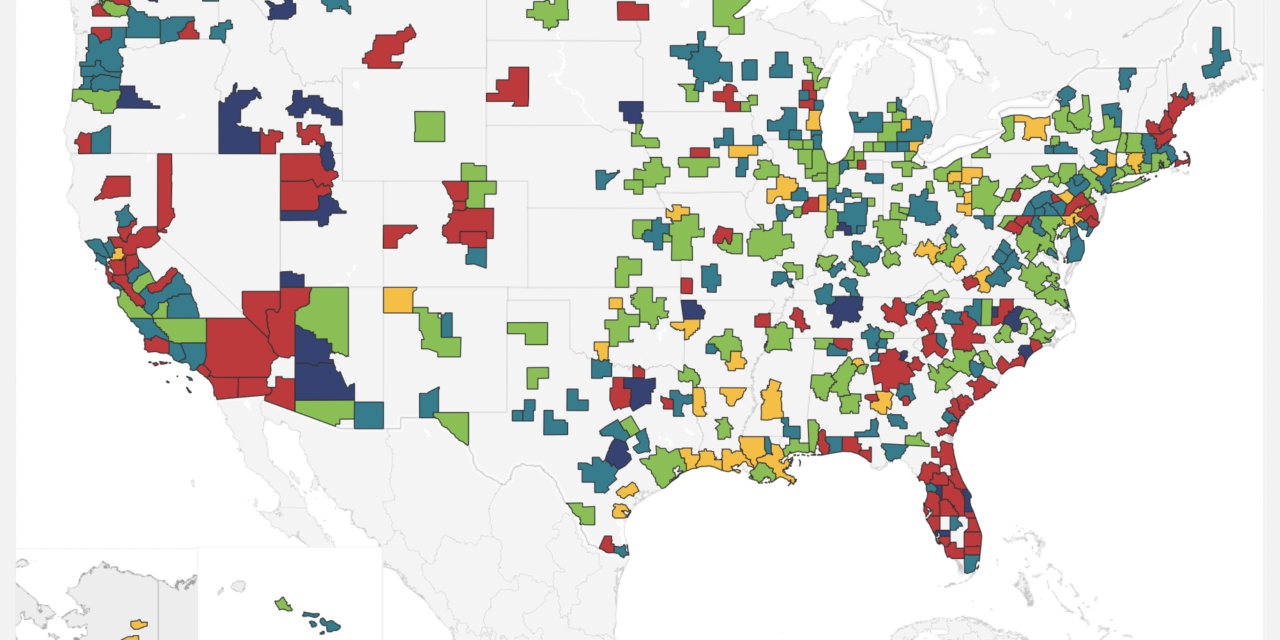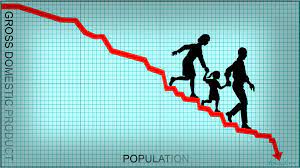Map: Green cities are Tier IV which includes Memphis
The bright spot in the Memphis region’s ranking in last year’s Best-Performing Cities index faded some in this year’s ranking – as the region fell from #128 to #135. The annual index is issued by economic think tank Milken Institute.
In 2022, it was encouraging that Memphis MSA moved up 38 places in the index, so taking a glass half-full approach, we are still 31 positions ahead of the #166 ranking two years ago.
However, it still means that yet again, the Memphis region’s economic vitality falls outside the top 100 in the yearly ranking of the 200 largest U.S. cities. In the past 12 years, greater Memphis has been in the top 100 only once, and even then, in 2012, it eked in at #99.
Meanwhile, Tennessee’s large sister metros rank significantly higher than Memphis. Nashville is #4, Knoxville is #32, and Chattanooga is #72.
So, while it’s hardly time to break out the champagne toasts for our marginal economic progress, it’s stating the obvious to say our economy remains fragile and our growth continues to be incremental.
The Top 100 Glass Ceiling
The Milken Institute report said: “The core components if the index, included every year, are job creation, wage growth, and output growth, especially in high-tech sectors…Although much was written about the pandemic-driven urban exodus, the out-migration narrative was largely overstated. According to the latest census data, migration levels in the US have hit historic lows, even when COVID-related migrations are accounted for.”
Our community only breaks into top 100 in one category – the 12-month short-term job growth – and in that category, it ranked #84. It got close to breaking the glass ceiling with jobs growth and wage growth but it came up barely short.
Perhaps it’s a case of wearing rose-colored glasses, but these indicators could be seen as promising, considering that our region has more people on payroll than ever before, according to an announcement a few months ago by the Greater Memphis Chamber.
The Memphis region’s weakness in the tech sector has always been a drag in this ranking and that remains the case.
The Top 10
The top 10 best-performing cities for 2023 and their place last year are:
Provo/Orem (stayed #1);
Austin/Round Rock (gained 1place to #2):
Raleigh (gained 13 places to #3)
Nashville/Murfreesboro/Franklin (gained 21 places to #4)
Boise (gained 10 places to #5);
Dallas/Plano/Irving (gained 4 places to #6);
Wilmington NC (gained 14 places to #7)
Phoenix/Mesa/Scottsdale (dropped 4 places to #8);
Fayetteville/Springdale/Rogers (dropped 1 place to #9);
Palm Bay/Melbourne/Titusville FL (dropped 5 places to #10.
Where Memphis Stands
The following is the ranking of regions that we consider peer cities – the asterisks indicate the cities on the Chamber of Commerce dashboard as “Comparison Metro Areas”:
#3 – Raleigh
#4 – Nashville*
#26 – Atlanta
#27 – Jacksonville
#32 – Knoxville
#69 – Indianapolis*
#72 – Chattanooga
#97 – Louisville*
#110 – Birmingham*
#113 – Cincinnati
#116 – Kansas City*
#125 – Oklahoma City*
#131 – Baltimore
#135 – MEMPHIS
#140 – St. Louis
#145 – Little Rock
#160 – Richmond
#164 – Cleveland
#178 – Detroit
#187 – Milwaukee*
#193 – New Orleans*
Breaking It Down
Here’s the Memphis region’s 2023 rankings by category:#135 – Overall rank
#128 – Previous year rank
#127 – Jobs Growth 2020-2021
#104 – Jobs Growth 2016-2021
#101 – Wage Growth 2020-2021
#116 – Wage Growth 2016-2021
#84 – Short-term Jobs Growth (12 months)
#139 – High-tech GDP 2020-2021
#140 – High-tech GDP 2016-2021
#161 – High-tech concentration 2020
#128 – LQ Count 2020
#166 – Broadband Access 2020
#126 – Housing Affordability 2017-2021
#131 – Housing Affordability 2020-2021
Memphis Over Time
Here is the Memphis ranking in the Best-Performing Index over time
#135 – 2023
#128 – 2022
#166 – 2021
#152 – 2020
#145 – 2018
#148 – 2017
#149 – 2016
#182 – 2015
#145 – 2014
#150 – 2013
#99 – 2012
#191 – 2011
Five Principles
After only breaking the top 100 once in 12 years, it seems timely to consider Brookings Institution’s five principles to create a higher growth economic trajectory by getting the markets and the civics right:
- Set the right goals. Set long-term goals that go beyond traditional headline economic indicators to achieve more robust measures of regional growth, productivity, and inclusions while also setting shorter-term metrics to monitor progress.
- Grow from within. Leaders in new approaches to economic development focus on strengthening assets that enable their distinctive industries to flourish and grow from within, rather than rely primarily on marketing to recruit individual firms from elsewhere.
- Boost trade. Contemporary economic development leaders actively support and promote expert growth and trade with other markets in the U.S. and around the world to deepen their industry clusters and bring new resources and income into the region.
- Invest in people and skills. The skills of workers and level of human capital in a region are critical factors in determining the competitive position of firms and the path to growth, prosperity, and inclusion.
- Connect place. The most forward-leaning leaders are harnessing regional markets and connecting local communities to them. Markets – industrial, labor, and housing – are regional but the people and assets that matter to markets are local.
Cautionary Message
As Brookings points out, no one has cracked the code on bringing deep prosperity to cities and metro areas across the United States. It is time for Memphis to aim higher and act bigger to improve economic performance and our community’s future.
The status quo falls short, it says, when it produces siloed, short-term gains; when it targets individual firms or the wrong sectors, and when it offers incentives and subsidies that benefit the few.
In particular, Memphis should pay special attention to this cautionary message: “Firms that take an incentive are not more likely to create jobs than those that move into a state or region without one. Defraying property tax obligations through vehicles such as tax increment financing to attract a firm or commercial development removes revenue from the tax base that could have supported schools, community policing, and other public services that matter to industry and workers. In general, the attention paid to firm attraction far outweighs the small portion of jobs that result from such moves.”
Source: Best-Performing Cities 2022 – Charting Economic Resilience and Opportunities
Brookings Institution Metropolitan Policy Program: Remaking Economic Development
***
Join us at the Smart City Memphis Facebook page and on Instagram for daily articles, reports, and commentaries that are relevant to Memphis.





As usual, a good commentary on the Memphis economy. I used to teach a class called the “The Memphis Economy.” Our basic question was “is Memphis a place or just a gas station on the Interstate of life?” Well, that was a hard question to answer 25 years ago, and it still is today. Even in agricultural times, Memphis was a transshipment center and a retail trade center for the surrounding region. Today FedEx and the various trucking/rail companies still provide that aura for the city’s economy. When you add the history of a large, poor Black population to that mix, you have the Memphis economy of today. Memphis has some attributes that you don’t find in many of our comparable cities. Memphis is fairly easy to live in, and it is very easy to get around in. It often has a ‘small town feel’ that makes living here worthwhile, particularly for the affluent middle class.